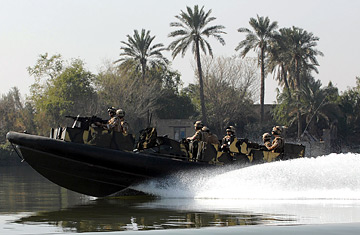
British Royal Marines from 539 Assault Squadron Royal Marines conduct operations on waterways in the Basra region of southern Iraq as part of Operation Troy.
Iran justified its capture of the 15 Brits by claiming they had been in Iranian territorial waters — a claim hotly disputed by Britain. Although boundaries are somewhat contested in the Shatt al-Arab waterway, and British officials had initially said the Iranian action may simply have been based on a misunderstanding, the British position hardened over the weekend, with Prime Minister Tony Blair denouncing the Iranian action as "unjustified and wrong," and warning that Britain viewed it in a serious light. On Monday Iraq backed London's claim that the incident had occurred inside Iraqi waters, which Britain patrols under U.N. mandate.
If the incident had been based on a misunderstanding over where Iran's waters begin and end, it might be expected to follow the trajectory of a similar episode in 2004, in which eight British personnel were released by Iran on the fourth day of their captivity. But on Day 4 of this particular crisis, it's far from clear that a similar course will be followed: Iranian officials have even floated the possibility of putting the captive Brits on trial for illegally entering Iranian territory. At the same time, Tehran is leaving itself room to back down by announcing that the Brits are currently being interrogated to determine whether, as the Iranians put it, their entry into Iranian waters was intentional or unintentional.
The relatively low-key British response thus far resonates with the fact that London, unlike Washington, has ruled out the option of military action for dealing with Iran's nuclear program. By contrast, if the Iranians had captured U.S. personnel, it's not hard to imagine (particularly given the legacy of the 1979 hostage crisis) that the crisis would have an altogether more cataclysmic ring; indeed, a senior U.S. commander working alongside the British forces in the region told a British newspaper that U.S. troops caught in a similar situation would not have surrendered to the Iranians without a fight.
But the outcome of the standoff may well depend on the strategic calculations of the Iranian leadership. Seizing the British troops a day before the U.N. Security Council voted on sanctions against Iran over the nuclear standoff was widely interpreted as Iran sending a none-too-subtle reminder of its capacity for disruption at the epicenter for the global oil economy. Oil markets certainly took the hint, with prices scooting up to their highest this year on Friday following news of the Iranian action.
But a number of Middle East analysts have also suggested that Iran may be intending to use the British personnel as a bargaining chip to seek the release of a number of Iranian officials currently being held by the U.S. inside Iraq. If so, that might prove to be a reckless gamble, precisely because the Bush Administration has demonstrated a far greater appetite for confrontation with Iran — as suggested by the capture of Iranian operatives in Iraq in the first place.
Those within the Iranian leadership advocating caution and pragmatism would point not only to the dangers of provoking the West, but also to a relatively positive diplomatic outlook: The new U.N. sanctions are only a mild intensification of those previously adopted, and the debate over them revealed important rifts — not only are key players such as Russia, China and the EU reluctant to dramatically increase sanctions and eager to return to negotiations with Iran, but key players in the developing world such as South Africa and India have more aggressively stressed Iran's right to nuclear energy. So even as Russia reportedly squeezes the Iranians by delaying the delivery of fuel to the Bushehr nuclear reactor — although both sides insist this is simply a dispute over payment — Moscow seeks a diplomatic compromise rather than a gradual escalation of sanctions.
Iran's Supreme Leader Ayatollah Ali Khamenei, and the national security council on whose counsel he relies on such issues, face an important judgment call. The outcome of the standoff over the British marines may be largely determined by whether the voices of pragmatic accommodation prevail over those of confrontation in Iran's chambers of power. And that, in turn, may well determine whether the nuclear standoff is to be resolved without confrontation.
